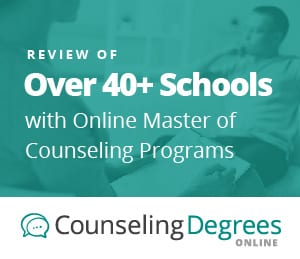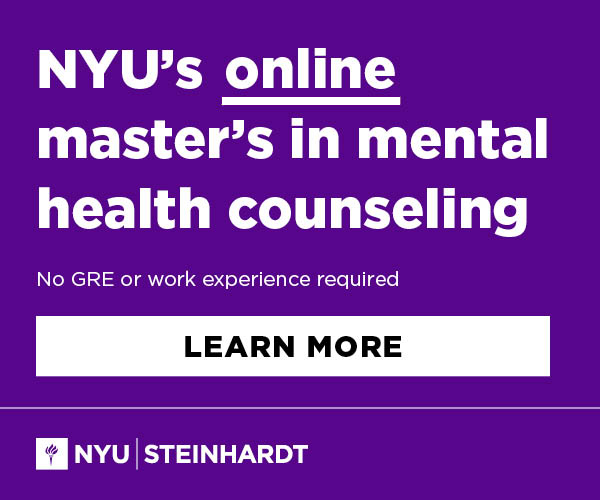 Walden University : MS Dual Degree in Clinical Mental Health Counseling and School Counseling (CACREP Accredited, six specializations to choose from)
Walden University : MS Dual Degree in Clinical Mental Health Counseling and School Counseling (CACREP Accredited, six specializations to choose from) Walden University : MS in School Counseling (CACREP Accredited)
Walden University : MS in School Counseling (CACREP Accredited) Liberty University : MED: School Counseling (Online with required intensives)
Liberty University : MED: School Counseling (Online with required intensives) Grand Canyon University : Master of Education in School Counseling (Take the next step toward excellence with a master's degree in Education from GCU.)
Grand Canyon University : Master of Education in School Counseling (Take the next step toward excellence with a master's degree in Education from GCU.) The Chicago School : Ph.D. in Counselor Education and Supervision (Online Programs.)
The Chicago School : Ph.D. in Counselor Education and Supervision (Online Programs.) University of Denver : Master of Arts in School Counseling (No GRE required)
University of Denver : Master of Arts in School Counseling (No GRE required) University of Wisconsin – Superior : MSE Counseling - School Counseling Track (100% Online, No GRE Required)
University of Wisconsin – Superior : MSE Counseling - School Counseling Track (100% Online, No GRE Required) Arkansas State University : MSE School Counseling - Crisis & Trauma Concentration (100% Online, No Teaching Experience Required)
Arkansas State University : MSE School Counseling - Crisis & Trauma Concentration (100% Online, No Teaching Experience Required) Arkansas State University : MSE School Counseling - Special Populations Concentration (100% Online, No Teaching Experience Required)
Arkansas State University : MSE School Counseling - Special Populations Concentration (100% Online, No Teaching Experience Required)What Is a High School Guidance Counselor?
A high school guidance counselor is a trained professional who works in secondary education settings to support and enhance students' academic and personal development. Their role is crucial in helping students navigate the complex landscape of high school education and prepare for future career or college opportunities.
Guidance counselors assess students' abilities and interests, assist in course selection, and provide support with college applications and scholarship searches. Beyond academic guidance, they also address students' personal issues, ranging from social dynamics to mental health challenges, ensuring a supportive environment that fosters students’ overall well-being.
In their daily duties, high school guidance counselors collaborate closely with parents, teachers, and school administrators to create a comprehensive support network for each student. They may also lead workshops or informational sessions on topics such as bullying, drug abuse prevention, and college readiness.
Overall, the goal of high school guidance counselors is to ensure that students not only succeed academically but also develop the skills and confidence needed to navigate adulthood effectively.
What Does a High School Guidance Counselor Do?
High school guidance counselors have a multifaceted role within the educational system, tasked with supporting students' academic, career, social, and emotional development. This section outlines the core responsibilities of a high school guidance counselor and the impact they have on the student community.
Academic Advising
High school guidance counselors play a key role in academic advising, assisting students in course selection that aligns with their future goals, whether they aspire to attend college, pursue vocational training, or enter the workforce.
They help students understand graduation requirements and encourage them to challenge themselves with advanced courses when appropriate. Additionally, they monitor students’ academic progress and intervene with support strategies if students are at risk of falling behind.
Career and College Preparation
Guidance counselors are instrumental in preparing students for life after high school. They organize college fairs, coordinate college visits, and help students navigate the complex process of college applications and financial aid. For students considering vocational programs or immediate workforce entry, counselors provide resources and guidance on opportunities that match their skills and interests.
Personal and Social Support
Beyond academics and career planning, high school guidance counselors address the personal and social challenges students may face. This includes counseling students through personal issues, such as family difficulties or mental health concerns, and facilitating conflict resolution and peer relationships. They work closely with students to develop coping strategies and resilience, promoting a healthy psychological and emotional state.
Crisis Intervention
In times of crisis, such as a community tragedy or a student's personal crisis, guidance counselors provide immediate support and intervention. They are trained to handle sensitive situations with empathy and professionalism, ensuring that students have access to necessary resources, including referrals to mental health professionals if needed.
Collaboration with Parents and Staff
High school guidance counselors also serve as liaisons between students, teachers, and parents. They communicate regularly with parents to keep them informed about their child’s academic and personal development and collaborate with teachers and staff to implement effective support measures for students.
Program Development
Many guidance counselors are involved in developing and implementing educational programs that enhance the school environment. These programs may focus on anti-bullying, drug prevention, college readiness, and other relevant topics that contribute to a safe and productive school culture.
High school guidance counselors are integral to the support and success of students during these formative years. By fulfilling these diverse roles, they ensure that students not only achieve their academic goals but also develop the skills and confidence needed for personal success beyond high school.
What Degree Is Needed to Become a High School Guidance Counselor?
The journey to becoming a high school guidance counselor typically begins with a solid educational foundation in a relevant field. Prospective guidance counselors must first obtain a bachelor’s degree, followed by a master’s degree, which is often a requirement for licensure in most states.
Bachelor's Degree Requirements
A bachelor's degree in counseling, psychology, education, social work, or a related field serves as the initial step toward a career in guidance counseling. This degree provides an essential understanding of human behavior, learning strategies, and developmental psychology.
Courses in child and adolescent development, educational psychology, and counseling fundamentals are highly beneficial for those intending to pursue a career in this field.
Master's Degree in Counseling
Following the completion of a bachelor’s degree, obtaining a master’s degree in counseling or a master’s in school counseling is typically necessary. These graduate programs are specifically designed to equip students with the advanced counseling skills required to address the diverse needs of students.
The curriculum often includes topics such as the following:
- Counseling techniques: Training in various counseling methods tailored to adolescents
- Ethics in school counseling: An exploration of the ethical considerations specific to counseling in an educational setting
- Crisis intervention: Techniques for managing emergency situations involving students
- Special education: Understanding the needs and legal aspects of working with students who require special education services
Many master's programs also require internships or practicums in school settings, providing hands-on experience in guidance counseling under the supervision of licensed professionals.
What Are the Other Requirements to Become a High School Guidance Counselor?
In addition to academic qualifications, becoming a high school guidance counselor involves several licensing and certification steps, which can vary significantly from one state to another.
Licensure Requirements
Most states require school guidance counselors to obtain a specific license to practice in public schools. This process typically involves:
- Completion of a master’s degree program: A master's degree in counseling or a related field is necessary.
- Supervised experience: Accumulating a set number of hours in a supervised clinical setting is often required.
- Examinations: Candidates must pass state-specific exams that assess knowledge of school counseling practices and ethical standards.
Certification Options
While not always mandatory, obtaining professional certification can enhance a counselor's qualifications and career prospects. Certifications such as the national certified counselor (NCC) demonstrate a counselor’s commitment to professional excellence and adherence to national standards.
Continuing Education
Continuing education is crucial for maintaining licensure and staying current with the latest counseling practices and educational methodologies. Many states require a certain number of continuing education credits every few years to renew the counseling license.
Consider a Featured Online Counseling Program
| School and Program Information | Online Program? Entry Requirements |
Course Information |
|---|---|---|
| Walden University
MS Dual Degree in Clinical Mental Health Counseling and School Counseling
 CACREP Accredited CACREP Accredited |
✔ Online
GRE scores not required |
The counseling field is in need of qualified, compassionate professionals like you to meet the demand for services. In Walden's clinical mental health counseling and school counseling dual degree program, you’ll gain the insights and hands-on training to positively impact the lives of children, adults, and families. Learn More |
| Walden University
MS in School Counseling
 CACREP Accredited CACREP Accredited |
✔ Online
GRE scores not required |
School counselors help students overcome obstacles and shape successful futures. Walden’s online MS in School Counseling program will give you a solid foundation in school counseling theories, approaches, and best practices while enabling you to gain hands-on experience. Learn More |
| Liberty University
MED: School Counseling
 CACREP Accredited CACREP Accredited |
✔ Online
Online with required intensives |
Liberty University’s CACREP-accredited Master of Education (M.Ed.) in School Counseling can help equip you to work as a school counselor in Christian, public, and private schools. Online and on campus. Training Champions for Christ since 1971. Learn More |
| Grand Canyon University
Master of Education in School Counseling
NASAC Accredited |
✔ Online
|
At GCU, school-counselors-in-training candidates develop into more than school counselors, they grow into compassionate, servant leaders with strong ethics and morals to positively make a greater difference in communities and the lives of children. Learn More |
| The Chicago School
Ph.D. in Counselor Education and Supervision
|
✔ Online
Master's Degree Required. |
The online Ph.D. in Counselor Education and Supervision program prepares graduates to act as educators and leaders in the field of counseling. Ph.D. Supervision students engage in the evaluation of theoretical and practical aspects of counseling through both qualitative and quantitative research. Learn More |
| University of Denver
Master of Arts in School Counseling
Designed to adhere to CACREP standards |
✔ Online
No GRE Required; Minimum GPA 2.5 Required |
Earn a Master’s degree in School Counseling online from the University of Denver. Learn from doctoral-level faculty in live classes and gain experience through mock counseling and in-field training. No GRE required. Complete in as few as 24 months. Learn More |
| University of Wisconsin – Superior
MSE Counseling - School Counseling Track
|
✔ Online
100% Online, No GRE Required |
Aligned to state law and accreditation standards, our programs equip you with the academic and professional development that will prepare you for the Wisconsin and/or Minnesota counseling licensure exams. Designed for teachers and nonteachers, this program provides the professional development and practical experience you need to enrich your counseling acumen and grow your impact on students' wellbeing. Learn More |
| Arkansas State University
MSE School Counseling - Crisis & Trauma Concentration
|
✔ Online
100% Online, No Teaching Experience Required |
Learn to foster the mental health wellbeing of K-12 students who have experienced life-changing traumatic events. Gain the specialized knowledge and tools you need to be fully qualified in supporting students from all backgrounds. Learn More |
| Arkansas State University
MSE School Counseling - Special Populations Concentration
|
✔ Online
100% Online, No Teaching Experience Required |
Designed to intentionally hone your expertise in specific subgroups, this master's program online equips you to counsel K-12 students facing distinctive challenges. Areas of focus include special education, gifted and talented, and English as a second language. Learn More |
*Sponsored Counseling Programs
Online CACREP Accredited programs | Online MPCAC Accredited programs
Why Become a High School Guidance Counselor?
Choosing a career as a high school guidance counselor offers a unique opportunity to make a profound impact on young people's lives during a critical stage of their development. This role is not only professionally rewarding but also offers personal fulfillment through various aspects of the job.
Making a Difference
One of the most compelling reasons to become a high school guidance counselor is the ability to make a significant difference in the lives of students. Counselors help shape students' futures by providing academic guidance, college and career planning, and personal support. They play a crucial role in helping students overcome obstacles and achieve their potential, which can be incredibly gratifying.
Job Satisfaction
High school guidance counselors often report high levels of job satisfaction. This comes from seeing the direct impact of their work on students' success and well-being. Whether it’s through guiding a struggling student to improve academically or supporting a student's application to their dream college, the tangible outcomes of their efforts are deeply satisfying.
Professional Growth
The field of school counseling is continually evolving, offering numerous opportunities for professional development and growth. Counselors can specialize in areas such as crisis intervention, special education, or career counseling. Additionally, professional development workshops and conferences keep counselors at the forefront of educational strategies and counseling techniques.
Stable Career in Education
School counseling offers a stable career within the education sector. With the ongoing need for student support services in schools, the demand for qualified counselors remains steady. This role provides a secure employment landscape with benefits typically associated with educational institutions, including summers off, holiday breaks, and solid retirement plans.
Where Do High School Guidance Counselors Work?
High school guidance counselors find employment in a variety of settings, each offering unique opportunities to influence the educational trajectory of students. Below are typical environments where guidance counselors work:
- Public high schools: Counselors in public schools work with a diverse student population, often dealing with a wide range of socioeconomic backgrounds.
- Private high schools: In these settings, counselors may have more resources at their disposal and typically work with smaller student caseloads, allowing for more personalized guidance.
- Charter schools: These innovative public schools offer different operational freedoms compared to traditional public schools, often requiring counselors to adapt to unique educational philosophies or curriculums.
- Boarding schools: Working in a boarding school allows counselors to engage with students in a more comprehensive manner, often addressing academic and residential life issues.
- Online schools: With the rise of digital education, counselors may also work in virtual settings, helping students navigate online learning environments effectively.
- Alternative schools: These schools cater to students who might not thrive in traditional educational settings, often requiring counselors to employ alternative strategies tailored to diverse learning needs.
Each of these settings presents unique challenges and rewards, contributing to the dynamic and essential role of high school guidance counselors within the educational system. Whether in a bustling city school or a quiet private institution, these professionals are key to fostering safe and supportive learning environments for all students.
High School Guidance Counselor Salary
Compensation for high school guidance counselors can vary based on several factors, including geographic location, experience, and the type of institution.
Average Salary
The median annual salary for school and career counselors and advisors was approximately $61,710 in 2023, according to the U.S. Bureau of Labor Statistics (BLS). The median salary for professionals in this category who worked in elementary and secondary schools was $71,700.
Highest Salaries by Experience
Starting salaries for entry-level positions are typically lower, while experienced counselors can expect significantly higher earnings. According to Payscale, the salaries of school counselors were as follows in 2024:
- Entry-level counselors (0-4 years) can expect to start at a lower range, typically around $48,000 to $52,000 annually.
- Mid-career counselors (5-9 years) often see their salaries grow to about $58,000.
- Experienced counselors (10-19 years) may earn $63,000 or more.
- Late-career counselors (20+ years): Are at the top of the scale, potentially earning upwards of $70,000 in some regions and settings.
Highest Paying States
Certain states offer higher salaries for high school guidance counselors, reflecting cost of living differences and demand for skilled professionals. Some of the highest paying states in 2023, according to the BLS, include the following:
- California: $85,820
- Washington: $81,280
- Massachusetts: $79,670
- New Jersey: $79,030
- Maryland: $76,250
High School Guidance Counselor Career and Job Growth
The demand for school guidance counselors is expected to remain stable, with the U.S. Bureau of Labor Statistics projecting a growth rate of about 5% between 2022 and 2032. This growth is faster than the average for all occupations, influenced by several factors:
- Increasing student enrollments: As student numbers grow, particularly in regions with booming populations, the need for school counselors will increase to support their developmental and educational needs.
- Emphasis on student mental health: There is a growing recognition of the importance of mental health in educational settings, boosting demand for counselors skilled in addressing these issues.
- Retirement and turnover: As current counselors retire, new positions will open up, providing opportunities for new entrants into the field.
This promising outlook suggests that becoming a high school guidance counselor not only offers a rewarding career path but also job security and opportunities for advancement in the field of education.
 Walden University - MS in School Counseling (CACREP Accredited)
Walden University - MS in School Counseling (CACREP Accredited)
 Liberty University - MED: School Counseling (CACREP and NCATE through CAEP Accredited)
Liberty University - MED: School Counseling (CACREP and NCATE through CAEP Accredited)
 Grand Canyon University - Master of Education in School Counseling (NASAC Accredited)
Grand Canyon University - Master of Education in School Counseling (NASAC Accredited)
 The Chicago School - Ph.D. in Counselor Education and Supervision (WASC and WSCUC Accredited)
The Chicago School - Ph.D. in Counselor Education and Supervision (WASC and WSCUC Accredited)
High School Guidance Counselor FAQ
What Degree Do I Need to Become a High School Guidance Counselor?
To become a high school guidance counselor, you typically need a master’s degree in school counseling or a related field. Individuals typically need to hold a bachelor’s degree in psychology, education, or social work before pursuing their master’s. This educational path ensures that counselors are well-equipped with the necessary knowledge and skills to support students effectively.
What Do High School Guidance Counselors Do?
High school guidance counselors help students develop academically, personally, and socially. Their responsibilities include providing academic and career advice, supporting college application processes, addressing personal and psychological issues, and collaborating with school staff and parents to foster a supportive educational environment.
How Long Does It Take to Become a High School Guidance Counselor?
Becoming a high school guidance counselor typically requires about six to eight years of education after high school. This includes earning a four-year bachelor’s degree and completing a two to four-year master’s program. Additionally, some states require counselors to complete a certain number of hours in supervised clinical practice, which can take another year or two.
How Much Do High School Guidance Counselors Make?
The median annual salary for elementary and high school guidance counselors was approximately $71,700 in 2023, according to the U.S. Bureau of Labor Statistics.
What Skills Do I Need to Be a High School Guidance Counselor?
Effective high school guidance counselors possess a mix of interpersonal, analytical, and organizational skills. Key skills include:
- Empathy and communication: Ability to listen and respond to student concerns with sensitivity
- Problem-solving: Skills to develop practical solutions for academic and personal challenges students face
- Organization: Managing multiple cases and administrative tasks efficiently
- Advocacy: Ability to advocate for student needs within the school system
Are There Internship Opportunities for High School Guidance Counselors?
Yes, internship opportunities are a critical component of training for high school guidance counselors. Most master’s degree programs in school counseling require students to complete an internship or practicum. These experiences provide hands-on training in a school setting, where prospective counselors can apply their learned skills under the supervision of experienced professionals.
Discover Your High School Guidance Counselor Degree Path
Embarking on a career as a high school guidance counselor is a noble and fulfilling choice, suited for individuals who are passionate about supporting the educational and personal development of young people. This profession not only allows you to make a significant impact on the lives of students but also offers a stable and rewarding career within the educational system.
High school guidance counselors are integral to creating a supportive and nurturing school environment. They assist students in navigating the complex challenges of high school and planning for future success, whether in higher education or the workforce. The role requires a combination of academic qualifications, practical experience, and personal skills, all of which contribute to the effectiveness of the counselor.
For those considering becoming a high school guidance counselor, it’s clear that the journey involves substantial education and training through bachelor’s and master’s degree programs. However, the impact you can make on students’ lives and the professional satisfaction that comes from such meaningful work can make all the effort worthwhile.
With the right preparation and dedication, a career as a high school guidance counselor can be both a profound calling and a practical, satisfying profession.

 University of Denver - Master of Arts in School Counseling
University of Denver - Master of Arts in School Counseling University of Wisconsin – Superior - MSE Counseling - School Counseling Track
University of Wisconsin – Superior - MSE Counseling - School Counseling Track Arkansas State University - MSE School Counseling - Crisis & Trauma Concentration
Arkansas State University - MSE School Counseling - Crisis & Trauma Concentration
















